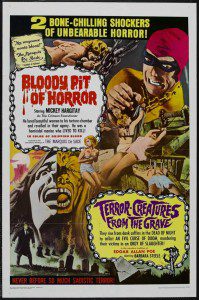I always relish a challenge, and so when our esteemed editor here at This Is Horror asked me if I might be able to write an article concentrating on the more horror-oriented aspects of the work of highly respected erotic movie auteur Radley Metzger, I jumped at the chance. Three of Metzger’s earlier adult works have just been released on blu-ray and DVD by Arrow Films, a UK film company that has done much to make available obscure and weird cult cinema to UK viewers over the last few years, and whose sterling work within our genre deserves encouragement.
Thus it was that, armed with practically no first hand knowledge of this director’s work and review copies of the three films in question – Camille 2000 (1969), The Lickerish Quartet (1970), and Score (1976), I found myself embarking on one of those journeys of cinematic discovery that can make being a fan of exploitation cinema so rewarding.
Prior to writing this article, the only Radley Metzger film I had ever seen was, perhaps not surprisingly, the only one that might be considered a horror film. It also happened to be his only bid for mainstream acceptance. In 1978 Metzger remade the old dark house classic The Cat and the Canary for famous British exploitation producer Richard Gordon. Metzger and Gordon peopled their cast with famous faces of British stage and screen including Honor Blackman (seen most recently in Cockneys vs Zombies), Edward Fox (blink and you’ll miss him in Herbert J Leder’s 1966 Nazi zombie pic The Frozen Dead), Daniel Massey (Vault of Horror) and Peter McEbery (Hammer House of Horror’s ‘Mark of Satan’ episode). Carol Lynley is the possible heiress to a fortune, trapped in the family pile with a bunch of disgruntled relatives and a psychopath know as ‘The Cat’ who has allegedly escaped from the asylum for the criminally insane that happens to be just up the road. There are the usual twists and turns and a couple of nasty murders – audiences of 1978 liked it enough to make Richard Gordon enough money to co-finance Norman J Warren’s Inseminoid (1981), after which he retired from the film business.
But back to Radley Metzger, a man most famous for directing softcore erotic films (like the ones mentioned above) in the late 1960s and early 1970s under his own name, before succumbing to the necessities of the Deep Throat revolution of the mid-1970s to produce similarly well-made hardcore titles like The Opening of Misty Beethoven (regarded by Boogie Nights director Paul Thomas Anderson as his favourite erotic film of all time) and The Private Afternoons of Pamela Mann under the pseudonym Henry Paris. Like Russ Meyer, Metzger quickly gained a reputation for himself as something of an auteur in a genre where it was well known that “the only Art was Jim Mitchell’s brother”, to slightly misquote the producers of the mid-1970s Marilyn Chambers-starring mega-hit Behind the Green Door. Unlike Mr Meyer, whose movies were essentially low budget knockabout sexy fun featuring women with enormous breasts, Radley Metzger, and his movies, has always been afforded more serious respect by film students. It was therefore with some interest, and not a little trepidation, that I sat down to view Arrow’s blu-ray presentations of movies that, while now considered classics of a kind, have never before received any kind of UK release.
1970’s The Lickerish Quartet is perhaps the most fascinating of the three, and certainly one I would recommend to any enthusiast for 1970s exploitation cinema. If I then say that it runs like David Lynch attempting to make a European horror film in the style of Jean Rollin, or possibly Jess Franco’s Succubus, I hope I’ve encouraged a few more to take a look at it as well. Like Camille 2000, Metzger made this movie near Rome with an Italian crew, and even the music is by horror regular Stevio Cipriani, who would go on to work on giallos like Antonio Bido’s Bloodstained Shadow and Umberto Lenzi’s deliriously bonkers Nightmare City.
 In the kind of gorgeously gothic Italian castle usually used by directors like Riccardo Freda or Antonio Marghereti to shoot horrors like Tragic Ceremony (1972) or The Bloody Pit of Horror, a dysfunctional family sits watching a strange black and white softcore erotic film. There is the father (Frank Wolff), the mother (Erika Remberg) and the son (Paolo Turco) who is probably in his early twenties. None of these characters have names in the credits. Well-dressed, rich and jaded, they begin to bore of the antics seen on screen and take a trip into town where a local circus is visiting. There they encounter a female motorcyclist (Sylvana Venturelli) who rides the wheel of death, and they become convinced she is one of the girls they have just seen in the film. They invite her back to their castle where things quickly get very strange indeed. They replay the film for her to watch, but now the camera angles in it have all changed. As the night and the next day progress, it becomes increasingly difficult to differentiate fact from fantasy, and the characters we are watching become interchangeable with the film they keep viewing (which appears to be set during the second world war). Finally the family disappears altogether to be replaced by the cast of the film (still with me?), and the family themselves take the place of the actors up on the screen. The ‘new family’ members repeat the dialogue that opened the movie and the film comes to an end.
In the kind of gorgeously gothic Italian castle usually used by directors like Riccardo Freda or Antonio Marghereti to shoot horrors like Tragic Ceremony (1972) or The Bloody Pit of Horror, a dysfunctional family sits watching a strange black and white softcore erotic film. There is the father (Frank Wolff), the mother (Erika Remberg) and the son (Paolo Turco) who is probably in his early twenties. None of these characters have names in the credits. Well-dressed, rich and jaded, they begin to bore of the antics seen on screen and take a trip into town where a local circus is visiting. There they encounter a female motorcyclist (Sylvana Venturelli) who rides the wheel of death, and they become convinced she is one of the girls they have just seen in the film. They invite her back to their castle where things quickly get very strange indeed. They replay the film for her to watch, but now the camera angles in it have all changed. As the night and the next day progress, it becomes increasingly difficult to differentiate fact from fantasy, and the characters we are watching become interchangeable with the film they keep viewing (which appears to be set during the second world war). Finally the family disappears altogether to be replaced by the cast of the film (still with me?), and the family themselves take the place of the actors up on the screen. The ‘new family’ members repeat the dialogue that opened the movie and the film comes to an end.
For a sexploitation film The Lickerish Quartet doesn’t have an awful lot of sex in it, and that which occurs is filmed so creatively and flamboyantly that today’s audiences would be hard pushed to think of this as pornography. Probably the best of these scenes takes places in an enormous and beautifully designed library where the floor is literally carpeted with words, and the shelves are pure white and graced with blood red volumes. The narrative itself doesn’t make sense but is never confusing, rather it seems to be a meditation on the nature of reality and if viewed in the right mood can leave one feeling properly weirded out by the end. There’s no actual horror in The Lickerish Quartet, but for anyone who is a fan of the heady weird fictions beloved of early 1970s EuroHorror directors, or indeed the films of David Lynch, this one is a must see. Arrow’s blu-ray transfer is the usual excellent job, and the film itself is so filled with vibrant colour that this is definitely the best way to see this item. The disc is also packed with extras, including a commentary track, featurette on the making of the film and a fascinating bit about the dubbing, which shows that even when Italian actors and actresses are speaking English, sometimes they’re better off being re-voiced.
Prior to The Lickerish Quartet Metzger made Camille 2000 (1969), a lush, arty, expensive-looking adaptation of Alexandre Dumas’ La Dame aux Camelias. While not a horror film by any means, it’s certainly worth a look by anyone interested in late 1960s Italian-made cinema. The plot is as much tragedy as love story, set in the rich swinging world of the Italian in-crowd. The production design is gorgeous and gorgeously weird (some of the apartments seem to consist of little other than mirrors and inflatable furniture). The photography is a treat, and looks all the better with Arrow’s blu-ray presentation. Piero Piccioni contributes a memorable hammond organ score and, combined with some nice performance and some very pretty girls indeed, Camille 2000 is worth at least one viewing by any serious film connoisseur.
Sadly, the same cannot be said of Score (1976), despite the promise of its plot summary that this is going to be a weird futuristic fantasy (it takes place in the town of Leisure which is close to the town of Decadence) it is strictly over-the-top cliched softcore sex romp material. Genre fans and Lynn Lowry completists may wish to see it because of Lowry’s starring role, coming as it did after her memorable turns in David Durston’s I Drink Your Blood, George Romero’s The Crazies and, of course, David Cronenberg’s Shivers, but for anyone else it’s certainly missable compared to the other films covered above. Still, for those interested Arrow’s BluRay disc is probably the best this film is going to look, and there’s a nice little interview with Lynn Lowry to complement things.
Overall, though, I have to give full marks to Arrow for releasing these, and in such excellent presentations. Radley Metzger was not a filmmaker whose works I would have thought of seeking out but my life is certainly better for having seen Camille 2000 and The Lickerish Quartet. Now all we really need to do is get Arrow to release The Cat and the Canary.
JOHN LLEWELLYN PROBERT
If you enjoyed John Llewellyn Probert’s column, please consider clicking through to our Amazon Affiliate links and buying some of his fiction. If you do you’ll help keep the This Is Horror ship afloat with some very welcome remuneration.
Buy John Llewellyn Probert fiction (UK)
Buy John Llewellyn Probert fiction (US)










